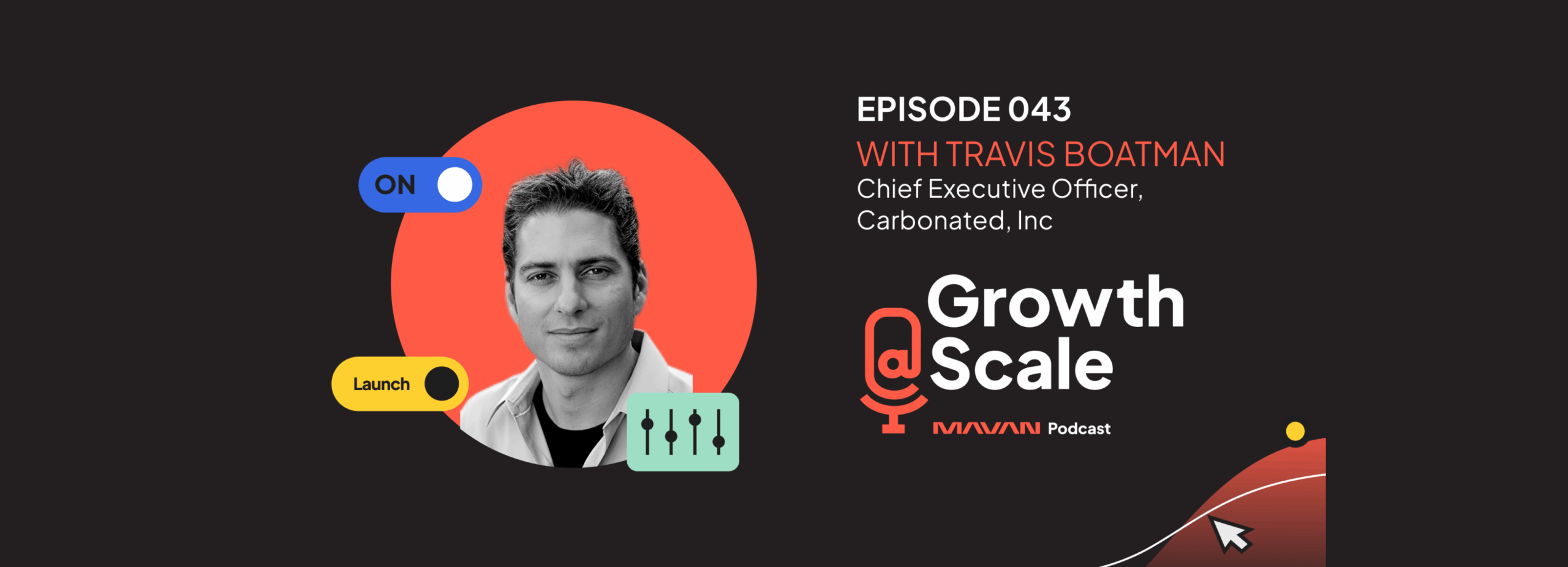In our latest episode of Growth@Scale, Matt Widdoes speaks with Katie Jackson, an organizational strategist, facilitator, and coach with 15 years of experience helping organizations transform and evolve.
Matt and Katie talk about how the way a company handles organizational changes as it grows is critical to success at the next level.
Give it a listen or read the transcript below.
Matt Widdoes
What does transformation mean to you and how does that kind of manifest at the various companies you’ve worked with?
Katie Jackson
Yeah, I have such a fascination for it and have spent my career focused on it. First, I had started in supply chain management, which is so much about systems and processes and how those continue to evolve. When it comes to people, though, it’s how are we shifting mindsets and behaviors to adapt and be resilient through all of this complex change?
And so we should think of organizations as consistently and continuously evolving, and it really is to keep up with what’s happening externally or also internally, how we’re reprioritizing things. Transformation really does start. It’s like an individual journey. Everyone has a different experience with change and transformation.
What I focus on with leaders is really how they help create the conditions for people to thrive within that complexity. And that means that it really requires them to take a look at themselves and see how they’re orienting to that as well and being a catalyst for that and an instrument for change.
MW
What does it look like? Kind of early. What does it look like when you’re starting to emerge and you’ve proven some fit and you’re going to be a company? Now when it was maybe in question on the last step, and then you’re really a company, things are going well, we’re starting to get looked at and talked about by the press.
How does that kind of function change or similar functions change throughout the lifecycle of an organization? And it’s early and late stage growth.
KJ
So it really does depend on trade-offs and prioritization. Everything can feel like a priority, but especially in the people function, we may not always have the budget to hire all of the FTEs that we need internally. So we’re always thinking about based on our needs, based on the outcome or impact we’re trying to have, how can we kind of curate the resources we need both internally and externally to make that happen? And so right now, candidly, I use some contractors for certain things because I just don’t have those people on my team.
But yet in order for me to be able to think strategically about building the company while also executing on the stuff we need, I can’t think that that’s a one woman show, right? I have to be able to also put my pride aside and be like, yes, I’m an expert at this, but right now my job is to architect where we’re going. So how can I leverage other experts to get that done for me so that’s I think around the 100-200 person organization, and then as a company scales and you can start to see how you’ve architected the organization or the function, you can start to really build this capabilities that you need internally.
But I think that’s kind of the lifelong question for an organization’s life cycle is what do we build versus buy? And what’s worth our time that’s unique to us, that only we could do, that is worth us investing in capability development versus we definitely need it, but is it worth our time to do ourselves.
MW
For early stage founders that maybe aren’t yet ready to engage with somebody like you, but. The skies are parting a little bit, and they’re starting to see and they’re starting to think about these little things.
What are maybe two or three things or even just one thing that somebody who aspires to build and maintain a really great culture can do early to make sure that when somebody like you comes in later, they’re like, hey, you’ve already done a lot of this good foundational stuff. There’s still lots more to do. But you have the kind of right underpinnings and you’ve done enough of these things to kind to be meaningful.
KJ
I think grounding ourselves in what culture is, is probably a good start. Let’s just start with what culture is. It really is how we do things around here, how we work and newer startups, it’s more organic and it’s implied and it’s just so easy. Like, we can read each other’s minds, but there are certain patterns that are happening, conditions that are making you successful or you’re learning what works or what doesn’t work.
Even just taking note of that stuff is really important because really what you’re establishing is how we want to work. Because how we’re working is what we think will help us be successful. So if we think about a vision or a strategy, the hypothesis is that our culture, the way we’re uniquely doing things, is what’s going to help us be more successful than our competitor. And so what do we mean by how it’s like, how are we choosing to communicate? How are we collaborating with one another? How are we making decisions together? How are we treating our customers?
It’s all the mindsets and the behaviors that are driving those results. And so in the beginning stages, yeah, people are doing that stuff inherently, but they’re not necessarily naming it. So I always coach people, make the implicit more explicit because as you start to scale, you’re going to make assumptions that people are just going to jump right on and be like, yes, I know how to read your mind. I know that this is how we work around here. It’s going to take so much time later to onboard them and ramp them up if you haven’t made those implicit norms more explicit. So even just doing a reflective exercise once in a while of.
This really worked well this quarter. We crushed it. Do a retro of what ways were we thinking and behaving that really made this possible? What do we want to keep moving forward? What do we want to lose? What’s not going to work for us? And even if it’s not a formal culture book or you’re not like, training everyone on your culture, just having those reflective moments helps you articulate it in the future. So I think that’s really important.
MW
What are other benefits you’ve seen that are maybe trackable, maybe more intangible of the work that goes into not only, I think, largely culture, but also some of the kind of change management and stuff like that?
KJ
Yeah, I mean, culture leads itself to. What do we value? And then from there, it’s like, well, what are the behaviors that we embody to live those values? And so that’s when you’re in an interview and you can spot that a person is embodying that value because of something they said, which is actually them behaving in a certain way. And it may have been a person that’s kind of like, on paper, not what you were looking for, but they actually are pleasantly surprising you that they could live into this value set. Where this also starts to take shape as you grow in an organization is in performance. When we start to have bigger organizations, even at 100 or 200, you start to really have to evaluate people’s performance based on objectivity. And so we can’t just be like, well, I think they did good this year. It’s like, well, what behaviors were they embodying? How did they drive results? And so when you can start to engage a team that needs to calibrate promotions for that year or something like that, it really does come down to like, are they living our values? Did they drive an impact? And that gives you a common language for a set that so I think that’s really important. It’s like, yes. Through the talent pipeline, are we able. To really assess who we want to bring into the organization. Can we evaluate them on this stuff? But then it also leads to the feedback and the coaching and the career development of what’s the gap for them?
And so it’s not that we expect everyone to be perfect on all the values or living our behaviors, we have what good looks like and we can evaluate them against that to coach them and help them step into that. And then we can’t forget that when we start to live our values and have those behaviors, that has a ripple effect on employee engagement, but then also how our customers are feeling, right.
So it really is that extension of brand in that way. So you really do use these values in different aspects of the organization. And I think that’s the key though is you can’t just say like, we’re collaborative. Well, what does that actually look like for you? Because collaboration at one company could mean something so different at another one. So really being able to paint the picture of what that looks like unique for your company and then helping translate that, because at the end of the day, employees, they want to know what it means for them. So cool. We’ve got our vision, we’ve got our strategy, we’ve got our OKRs, you even told me what our functional OKRs are.
But what does that mean for me in my day to day? How do you want me to behave? What’s expected of me? So it gives so much clarity when we can start to translate our expectations that we believe will help us be successful.
MW
So I’m curious, there’s a lot of people who are listening who are early stage founders. They maybe just raised 10 million. Maybe they just raised 20 million, which maybe we won’t call it early, but for kind of that type of listener or that type of leader at the company, if they’re not a founder, any advice you would give to a senior leader who they’ve made it past product market fit. They’re just now starting to scale. More significantly, they know they’re not going to drown and now it’s all about rowing as fast as they can, as happy as they can, as long as they can. What advice might you impart on them if you had the opportunity?
KJ
Well, first of all. Congrats. That’s really exciting. And it’s almost like the next level of their leadership, right? It’s time for them to embrace what’s next. But I do think the biggest watch out that I have seen time and time again is what got us to this point may not be exactly what gets us to the next level. And what I’m referring to are we’ve got our technical capabilities, we’ve got our vision around our product or our service, but now there’s a whole different set of capabilities that are required to lead a collective organization towards your goal. And so it is stepping into your leadership. And I think a lot of times, founders or anyone that has been an expert in their field of work or their discipline that serve them to get to the point that they’re at where it’s expedited their growth.
But all of a sudden it’s like you’re managing an executive team or you have even a team of 20 or 30 and you’ve never led teams before. What I would offer is to really embrace that growth mindset and that beginner’s mind and just really humbly be like, I know what I know, but there’s this whole other world of things that I need to equip myself with so that I can thrive and I can lead this next phase of the journey. I have seen some founders that would rather burn this shit to the ground like their own organization than let somebody tell them what to do or bring anyone in. And so I would say get excited about expanding your capability set and learning how to lead, and then surround yourself with the people that can balance you out. Um, you don’t have to be great at everything, but you’ve got to have the right people in your corner that will help you see around the corners that you can’t see on your own.
And then the only other thing I would say that’s like a double click into this is that as a company starts to grow, there is that middle layer, like the manager layer. And a lot of times those managers. People managers have never been managers of people. So while you’re learning how to be a founder, leading the whole organization, how are you equipping that layer to start to cascade and translate the strategy? Right? You have to be activating your strategy, but you’re relying on these managers to make that happen. So really investing and equipping managers to be really good managers. So you be a good leader, but then also make sure you have amazing managers, and that will expedite your progress and your success.
MW
Thank you so much. For the time today, Katie. You’re always amazing. I really appreciate the extra time you spent with us today, and I look forward to the next time. Thanks again. So great to spend time with you. Thanks. That was our talk with Katie Jackson on the importance of transforming your company culture. I hope you enjoyed it as much as I did. Thanks for listening to Growth at Scale. Check back soon for more chats about growth. Find more episodes, conversations, and blogs MAVAN.com. See you next time.
Book a complimentary consultation with one of our experts
to learn how MAVAN can help your business grow.
Want more growth insights?
Thank you! form is submitted
[hubspot type=”form” portal=”20951211″ id=”9c538ed2-fb12-45f1-a573-ad7953c058cc”]


